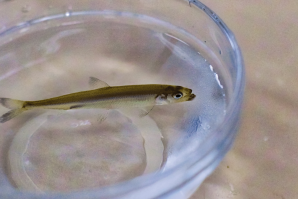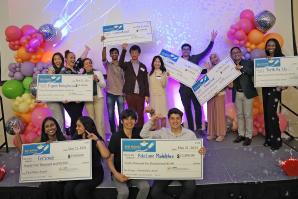Dr. Charles DeCarli knew his funding might be in trouble.
DeCarli, the director of UC Davis’ Alzheimer’s Disease Research Center, is co-principal investigator on a study, “The Clinical Significance of Incidental White Matter Lesions on MRI Amongst a Diverse Population with Cognitive Complaints” funded with a $35.9 million grant from the U.S. National Institutes of Health.
The study, which has more than 1,600 participants, helps to identify potential biomarkers for dementia. But the study also has the word “diverse” in the title at a time when concepts like diversity, equity and inclusion have been under fire at the federal level, and the Elon Musk-led Department of Government Efficiency has been slashing funding.
“The title had the word ‘diversity,’” DeCarli says. “I was fairly certain that that was going to trigger something.”
DeCarli’s premonition was correct, with the NIH sending DeCarli a notice dated March 25 that they had briefly terminated his remaining funding. While DeCarli successfully appealed the termination (his funding was reinstated on April 11), the episode was only the latest skirmish UC Davis has faced over federal funding.
The value of funding
Rep. Mike Thompson, whose district includes UC Davis and who has visited the Alzheimer’s center at The Cannery in Sacramento, didn’t hold back about DeCarli’s study facing the loss of funding.
UC Davis’ Alzheimer’s Disease Research Center is headquartered at
the Cannery in Sacramento. (Photo by Graham Womack)

“It makes absolutely no sense at all,” Thompson says. “Research isn’t like the overhead light in the dining room. You can’t flip it off and flip it on. It takes a commitment and … it takes a lot of work and you can’t start it, stop it, start it, stop it. It’ll never get done. And this is incredibly important research.”
If there’s been a common theme for cuts that UC Davis has been facing, it’s possibly a wholesale lack of understanding about the work being threatened. Scientists had to scramble to explain the value of smelt for the Sacramento River Delta when the UC Davis Fish Conservation and Culture Laboratory near Byron had its funding imperiled. It quickly became apparent that the little-known and dully named Hydrologic Engineering Center was critical for preventing flooding after its funding, too, was put at risk.
In this case, DeCarli’s team’s goal was to carry out a longitudinal study to develop a dementia risk profile related to vascular conditions.
“The goal of the study was to look at various measures … and ask the question: How do these measures predict who needs more intervention versus those people who are just concerned but are going to do okay?” DeCarli says. “And you can’t determine that until you see them repeatedly over time.”
In the March termination, the NIH stated that the funding award was “related to DEI” and that it no longer effectuated priorities for the agency.
“Research programs based primarily on artificial and non-scientific categories, including amorphous equity objectives, are antithetical to the scientific inquiry, do nothing to expand our knowledge of living systems, provide low returns on investment, and ultimately do not enhance health, lengthen life, or reduce illness,” notes the termination message, which DeCarli provided to Comstock’s.
“Worse, so-called diversity, equity and inclusion (‘DEI’) studies are often used to support unlawful discrimination on the basis of race and other protected characteristics, which harms the health of Americans,” the termination message continued. “Therefore, it is the policy of NIH not to prioritize such research programs.”
DeCarli got a tipoff from his contact at the NIH, who didn’t immediately respond to an interview request. “My program officer called me to warn me that I was going to get terminated, which was very helpful because they sent the termination notice to someone who no longer worked at UC Davis,” DeCarli says. “And so it took us a few days to find it.”
The termination message lists NIH Grants Management Officer Shellie Wilburn, Grants Management Specialist Cheryl Wall and Program Official Lina Garcia, none of whom responded immediately to requests for comment. An email sent to NIH’s general press line also didn’t draw a response.
Fighting back
Asked what was helpful in his appeal, DeCarli says he truly believed it came down to support he received through his institution.
DeCarli credited grants and legal personnel from UC Davis, as well as the office of University of California President Michael V. Drake and its Washington, D.C.-based consultants. “I got a lot of advice, particularly how to break down the response,” DeCarli says.
What DeCarli experienced doesn’t appear to be isolated. Thompson says he’s heard from many organizations that have had to review their documentation. He notes the experience of a transportation group. “They’ve had to go through and clean up everything, take ‘diversity,’ ‘woman,’ ‘ethnic,’” Thompson says. “Anything at all that these guys might find to be offensive, they’ve had to take it out. And it’s just outrageously stupid.”
While DeCarli’s funding has been restored, broader pushback on the wave of funding cuts might be tougher to accomplish, including efforts by Congress.
“I think it’s really hard right now,” Thompson says. “This is coming from the (Trump) administration. They’re not going to be influenced by anything any Democrats say. So unless we can get some Republican colleagues to grow a spine and stand up to this administration … a lot of people, a lot of programs are going to be harmed.”
DeCarli, for his part, has lower certainty about finishing his study than he would have had in the past.
“Two years ago, I would have told you, ‘Yeah, we’re really excited. We’ll finish this study. We’ll probably end up extending it to do even deeper research to have the opportunity to refine our predictive profile and maybe start to do interventional studies with this group of participants to improve their lives.’ But now, I can’t say any of that,” DeCarli says.
He adds, “There’s no clear path forward.”
–
Subscribe to the Comstock’s newsletter today.
Recommended For You

Hydrologic Engineering Center in Davis to Keep Federal Government Lease
Longtime center had been sent a lease termination notice
Behind a nondescript door in downtown Davis exists a little-known but vitally important piece of infrastructure, the Hydrologic Engineering Center. A recent threat to this center’s existence appears to have passed.

Scientists Attest to Value of UC Davis Smelt Lab
Federal funding has been imperiled for facility near Byron
The San Francisco Chronicle reported on Feb. 6 that the federal government was looking to not renew funding for the UC Davis Fish Conservation and Culture Laboratory after its current round expires on Friday. While sources close to UC Davis are confident of a new contract being signed with the U.S. Bureau of Reclamation, that hadn’t happened as of press time, and some are worried about what comes next.

A Quarter Century of Startups: Big Bang! Finalists Share $100K in Milestone Year
Checking in with past honorees of the UC Davis competition — some who’ve gone public, others who’ve pivoted careers
Today, the UC Davis Big Bang! awards ceremony honors 19 finalist teams with $100,000 in grants. For every founder that participates in the Big Bang, several of which have been spotlighted in Comstock’s Startup of the Month column and other stories, no path forward looks the same.

Older, Better, Faster, Stronger
Capital Region innovators build new paths to wellness and longevity
Doctors, researchers and trailblazers are exploring how
to use both tried-and-true methods and new tools to
improve physical and mental health as we age.



